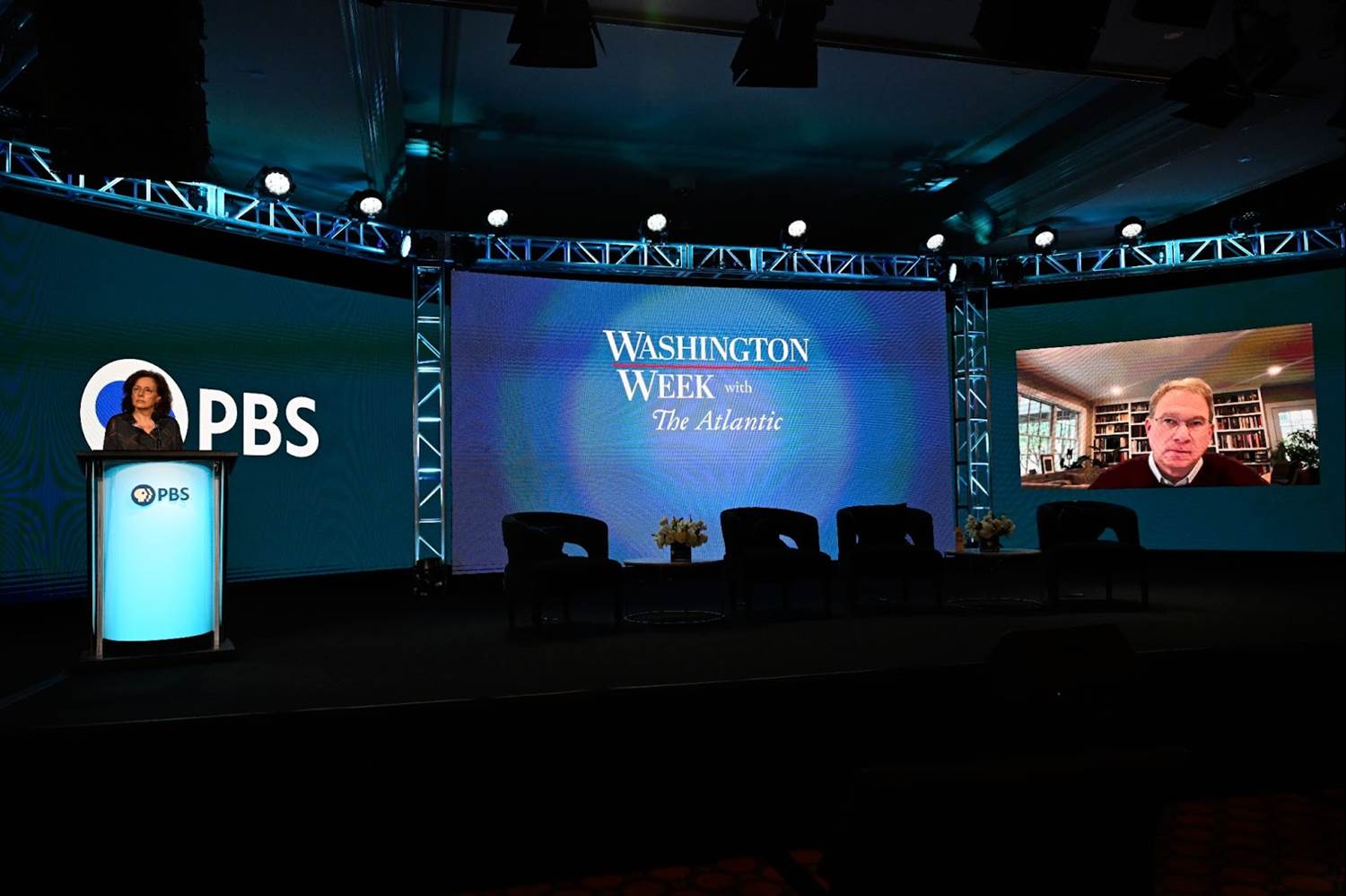“Friday night is a time to reflect on the whole week and to look ahead,” said Sara Just, senior executive producer of Washington Week with The Atlantic during a full day of the TCA Winter Press Tour devoted to PBS. Washington Week has been the longest-running primetime news and analysis program on television, with an impressive 56 years on air. The series recently partnered with The Atlantic and is experiencing noticeable growth since the rebrand, with twice the amount of social media engagements. But whether you’re a longtime viewer of Washington Week, an avid reader of The Atlantic, or are getting your first exposure to the show tonight, at its core, the show remains an honest place for conversations about the week’s biggest headlines.
“[Washington Week with The Atlantic] is maybe the last place where you can gather three or four journalists around a table, and have a straight-shot, 20–25-minute conversation about whatever the pressing issue of the day is,” explained Jeffrey Goldberg, the series’ tenth moderator and the first under the rebrand. He’s no stranger to being a talking head on other news shows, particularly on Sundays, where there’s a lot to cover in a short amount of time, plus commercial breaks that interrupt the flow. “Our audience are people who really want to go to the second, third, fourth levels… After we finish the show, invariably someone on the panel, usually a first-timer, will say, ‘That was an unbelievable experience. It was worth coming down to the studio because I actually got to talk, and I got to listen to other people talking, and then I got to ask them questions.’” It’s a unique experience in today’s news landscape.
Jeffrey Goldberg is naturally tapped into politics via his role as editor-in-chief of The Atlantic, but being the moderator of Washington Week requires an even deeper level of engagement. “I'm finding myself paying much more attention to the ins and outs of Washington politics all throughout the week just so I can keep up and get ready for Friday night. But obviously, Friday is a study day in earnest. What I do, and I liked doing this when I was more regularly a panelist on other shows, I really liked to talk to the panelists beforehand, not to plant questions but just to see where their thinking is at and what they're most interested in doing. And part of the show, if I get this right, the panelists are actually doing a lot of the work because the goal here is to bring actual reporters, people who have just come from The Pentagon, as was the case a couple of weeks ago during the first strikes on the Houthis, or coming from The White House, coming from Capitol Hill. I want to get better at this, but a lot of it is just, ‘What does your latest reporting tell us?’ I want them to bring it, and then I hope I have intelligent questions that could suss out more of the information.”
Having a trustworthy nonpartisan show like Washington Week with The Atlantic is always important, but even more so during an election year. “You've got to have a viewpoint diversity,” Goldberg shared of the composition of each episode’s panel. “Our audience wants a balance. They want to see the original veterans they’ve known for a long time and who have an incredible amount of wisdom, and they want to see new, fresh voices, and so it’s trying to just put that all together.” There are, however, the occasional roadblocks. “I’ve tried to get Fox [News] people on, but Fox won’t let them… Fox has some very good reporters, obviously, and I would like them to be on the show to participate in discourse with people from The New York Times, The Washington Post, ABC, NBC, and CNN, but I can’t right now.” But at the end of the day, Washington Week with The Atlantic cares more about journalistic integrity than popular talking heads. “I like to have people on the show who have actually spoken to the senators we’ve talked to, who we are talking about, spoken to the president, if that’s possible, spoken to the administration. So if there’s something that I’m privileging or we’re privileging, it’s that as well.”
Jeffrey Goldberg also had some wisdom for viewers who have grown distrustful of the information being reported. “There's no such thing as the mainstream media. There are different organizations that do things in different ways. But I do think that we could do a lot more to explain why we ask questions the way we do, why we bring up subjects.” When it comes to politically motivated cries that try to shape their coverage, Washington Week with The Atlantic refuses to hold anything back. “We’re not in the resistance. We’re just journalists. Every day, they have to try to figure out the best way to tell people what’s going on. You can’t tell people that Joe Biden isn’t old. That’s not credible. He’s the oldest president we’ve ever had. And so it has to be covered. It has to be covered in a plain-spoken way, and there’s no two ways about that.”
“We report what’s happened, and what’s being said, and what it might mean,” Sara Just concluded. “I know some people in the audience would prefer we’d ignore some actions on one side or the other, but that’s not our job. Our job is to tell the truth.”
You can hear the truth every Friday via Washington Week with The Atlantic on PBS. New episodes are broadcast live at 8:00 pm ET on most PBS stations (check local listings to confirm the broadcast time in your area). Past episodes are available to stream on YouTube and the PBS app.

